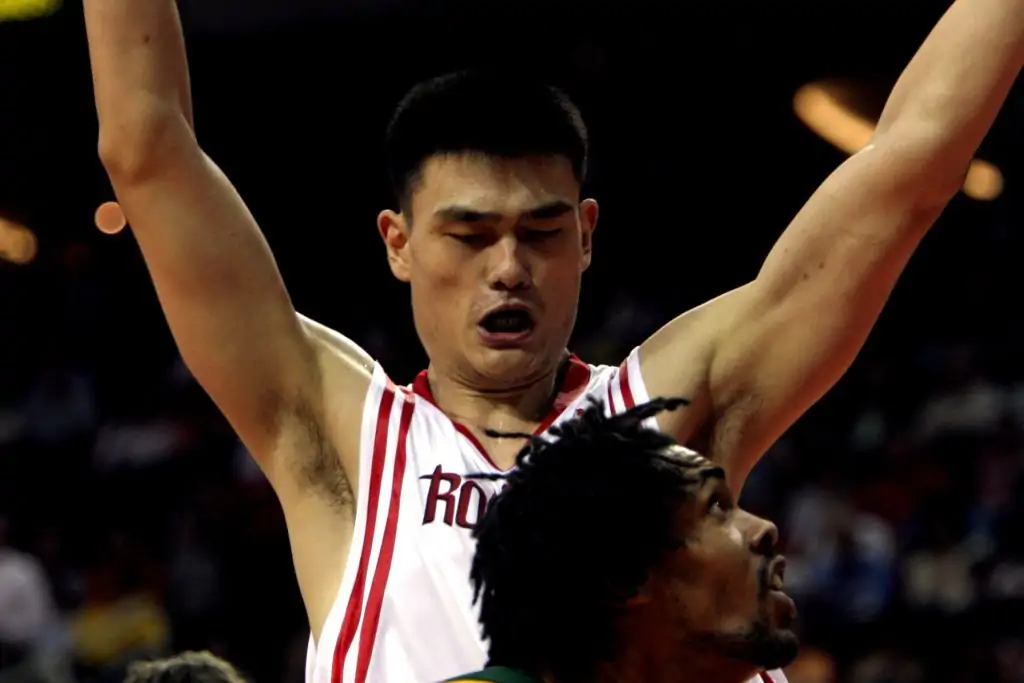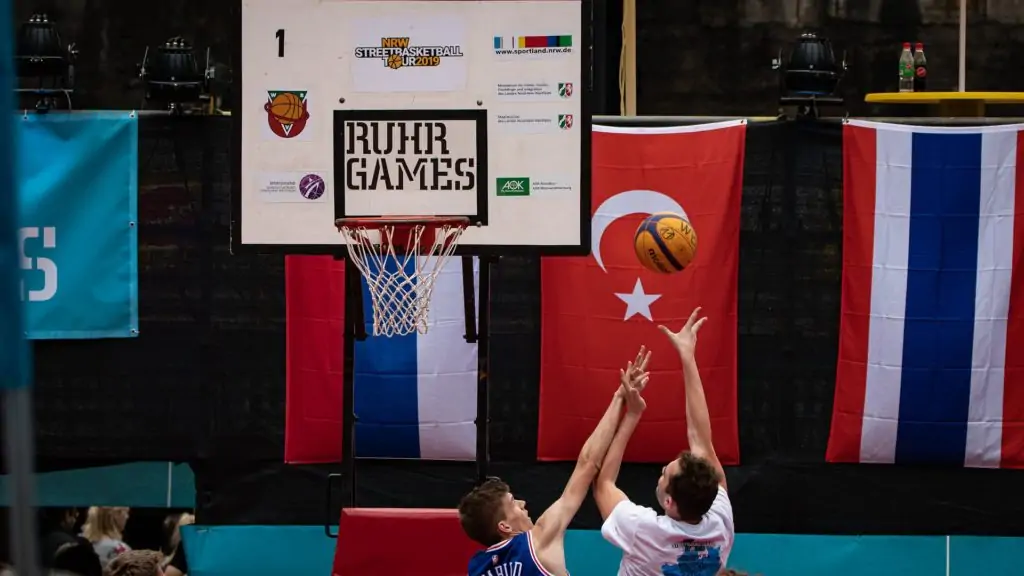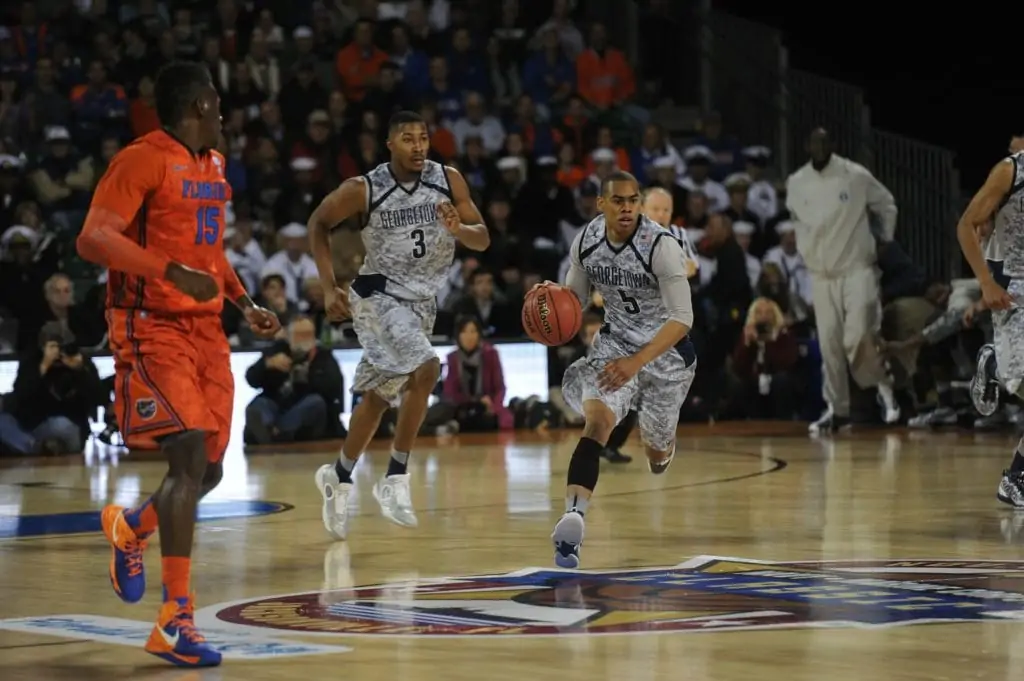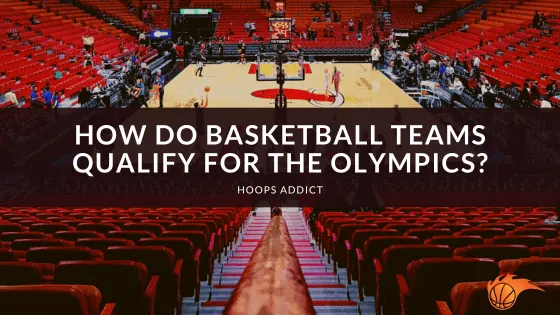With the dynamic nature of basketball and its constant rule changes, guarding in basketball and be somewhat could be somewhat tricky. Surely you can agree that the defensive end of the basketball court is critical.
If you cannot stop your opponents from scoring, no matter how good you are at playing offense, you will find it extremely difficult to win games. Some players are naturally good on defense, but others need to practice so that they can improve in this aspect.
Today we want you to help you with improving your defensive game. This article is going to be geared towards providing you with all you need to know to become lockdown defensive players.
 What is Legal Guarding in Basketball?
What is Legal Guarding in Basketball?
To be a lockdown a defender, a player must be able to legally guard their opponents. Establishing and maintaining a legal guarding position is one of the first steps that a player needs to master before they can be considered a lockdown defender.
Let’s take a look at what we consider to be a legal guarding position, how it is performed, and how it affects the basketball game. The legal guarding position is a position in which all players need to be in to play defense on a player with or without the ball. If defense is attempted outside of legal guarding position, it is considered to be a foul.
A player can be considered to be in legal guarding position if they are facing their opponent and they are grounded with both feet on the floor. A defensive player is able to move vertically within the imaginary cylinder created after they have established themselves on the floor. They can raise their arms above their head or jump straight up while playing defense inside the cylinder.
Now, to create contact, a defender must first establish a legal guarding position without contact. After they have established a legal guarding position, a defender can move laterally or backward towards the opposing player. The defender should not extend their arms, hips, shoulders, or legs outside of their cylinder to prevent the dribbler from getting by them.
Even if a player does not have the ball, the defender must respect the legal guarding position while playing defense. However, defending a player without the ball will require slight changes to what is observed as a legal guarding position. While guarding a player that does not have the ball, the defender must consider the player’s movement before establishing a legal guarding position.
They must ensure that before they take up a legal guarding position, the offensive player has sufficient time to see them and alter their speed or direction. Usually, the distance to take into account is not less than 1 step. After the defender has established a legal guarding position without creating contact, they can now start to defend their opponents, but they cannot use their appendages to prevent him from passing.
For any reason, if an offensive player has jumped into the air, the rules of the game allow for them to land unimpeded at the same spot that they jumped from. They are also allowed to jump and land at another place on the court provided that at a time, that space was not occupied by an opponent before they jumped.
Defenders must respect this rule before establishing a legal guarding position on a player that is in the air. Failure to do this will result in an unsportsmanlike foul and lead to an injury if the offensive player does not land properly.
 What is Lockdown Defense in Basketball?
What is Lockdown Defense in Basketball?
Lockdown defense is a term used in a lot of basketball circles, but what does it mean? The truth is, lockdown defense is based on perception and may vary based on who you ask. Offense in today’s game of basketball is very versatile. Often rule changes are made to accommodate the offense. We said that to say this, developing good basketball defense strategies is a lot harder these days than in the past, so it is unreasonable to expect a team or individual to prevent another from scoring consistently.
Lockdown defense in our eyes is performing above-average on the defensive end of the court to limit the number of touches, drives, and shot attempts made by your opponent. Defenders that are considered to be lockdown defenders can do one or more of the following things really well.
Ball a Denial
The best of defenders understand that the best and easiest way to defend a player is to prevent them from getting the ball in the first place. This is ball denial. To prevent your opponent from getting the ball, you need to stay close enough to your opponent when they are a pass away to render them out as a passing option or to intercept any passes that are intended for them.
Cut off the Lane
Baskets made close to the rim are considered to be a high percentage shot. Lockdown defenders understand this and try to prevent their opponents from getting it to the rim easily. They know how to move their legs, establish legal guarding position, come up with steals and deflections and keep their opponents out of the lane.
Shot Interference
If your opponents can’t shoot, then they can’t score. If you are a lockdown defender, you must be able to prevent your opponents from taking quality shots or taking shots period. There are lockdown defenders that lockdown post players by blocking their shots on the block or forcing their opponents to change their shots, making it difficult for them to score. Perimeter lockdown defenders are able to contest jump shots or block shots on the perimeter.
 How Do You Play Lockdown Defense in Basketball?
How Do You Play Lockdown Defense in Basketball?
Many different aspects go into playing defense properly. If you can master a lot of these, then you will quickly become a lockdown defender. It’s kind of an “if you put A and B together then you will get C” situation.
Being able to break down the different key factors in personal defense and work on them will help you improve them individually and improve your overall performance, making you a Lockdown defender. Let’s take a look at some of the different aspects of defense that you can work on to become a lockdown defender, the basketball defense fundamentals.
Footwork
To become a lockdown defender, you must have good footwork. Footwork is the base of defense. Your feet must move quickly and in the right way to position your body to stay in front of your defender. Whether on the perimeter or the blocks, you must be able to move your feet to match your opponent’s movements.
Your footwork should help you to stay in a position between your opponent and the basket. You will need to learn the correct combination of staying on the ball of your feet and being flatfooted in order to optimize your strength, speed, and agility while playing defense.
Discipline
Defense is all about discipline. If you have played basketball for a long time, you certainly would have heard players say, “if you reach, I teach.” Many of the younger players cannot play defense to contain their opponents and not try to steal the ball but contain their opponents until the right opportunity presents itself for a steal.
It is crucial that players learn how to contain their opponents and remain disciplined for the entire game and not try to reach for the ball in ill-advised situations. In addition to knowing when to go for a steal, being disciplined also means remembering what you learned during training for all the other aspects of defense and doing them when the situation presents itself.
Agility
Being agile means to maintain your speed and momentum while being able to quickly change direction. Agility is something that can be increased through training. Agile defenders are most often better than fast defenders. Defense on a particular player typically occurs within a small area on the court, so being agile will give you an advantage. Agility will help players to keep up with the offense. Be sure to check out our article on the best basketball agility drills.
Speed
Speed is an essential aspect of defense. If players are able to react quickly and cover the distance between point A and point B quickly, they will excel at being lockdown defenders. Try to work on your speed in short spaces so that you can intercept passes quicker, keep up with fast dribblers, and get back to the defensive line after an offensive possession.
Communication
Communication is key for both individual and team defense. Lockdown defenders know how to communicate with their teammates effectively. Your teammates can see what is behind you and communicate this better then if you were to constantly be looking behind you while playing defense. Communication is a two-way skill. In addition to relaying information, one must learn how to listen and interpret information received. This is the same on the basketball court.
Lockdown defenders listen to their teammate’s instructions while they are defending their opponents and react to the information being provided. An instance of this is when your teammates advise you of an oncoming pick, and you respond in anticipation of the pick.
Know your opponent
To become a lockdown defender, you must do your scouting so that you can know your opponent’s strengths and weaknesses. Often before we go into games, we are aware of the likely players that we will be guarding. Try your best to learn about these players’ tendencies and prepare for them so that you are not blindsided when you go into a game.
Work out defensive stance
Whatever you do in basketball is improved with practice. Defense is not different. The more you practice your basketball defensive stance, the better you will become. It is very important for you to work on your defensive stance so that if you are required to do this for an extended period of a game, you are endurance will be on par.
 What are the Violations of Illegal Guarding?
What are the Violations of Illegal Guarding?
If you do not practice and execute proper defense while in games, violations will be called against you. The basketball defense rules state that a player playing defense should not push, hold on to, charge into or impede the progress of an opponent by using their appendages or body in any abnormal way.
 3 Tips to Good Lockdown Defense
3 Tips to Good Lockdown Defense
Ball denial
It is always best to prevent your opponent from getting the ball so that your job will be easier. If you can prevent your opponent from getting the ball in the first place, you do not have to worry about dribbling or shooting.
Play to the weakness of the offense
Try to force your opponents to do things they are not good at. If your opponents are able to play to their strengths, it makes your job as a defender a lot harder. For example, if you know your opponent is stronger when they drive to the right, cut off the right dribble and force them to go left.
Work hard in the gym to be faster, stronger, and more agile.
If you are faster, more agile, and stronger than your opponent, you will have a breeze playing defense. Try to work as much and as hard as you can in the gym. Off-court training is as vital as on-court training.
Wrapping Things Up: Guarding in Basketball
Becoming a lockdown defender takes discipline and effort. Practice and do what you practice. Try to work harder than everyone else to be the best when you step on the floor. Defense can be broken down into many categories, such as speed, agility, footwork, discipline, and so on. Try to incorporate all of these into your game, and you will become a better defender.
Did you find this helpful? Want more posts like this? Check out our basketball FAQ articles here.
> Basketball Defensive Stance: What is It and How to Get Into It?
> How to Improve Basketball IQ: What Is It and How to Develop It

 What is Legal Guarding in Basketball?
What is Legal Guarding in Basketball?
 What is Lockdown Defense in Basketball?
What is Lockdown Defense in Basketball? How Do You Play Lockdown Defense in Basketball?
How Do You Play Lockdown Defense in Basketball?

 What are the Violations of Illegal Guarding?
What are the Violations of Illegal Guarding? 3 Tips to Good Lockdown Defense
3 Tips to Good Lockdown Defense

